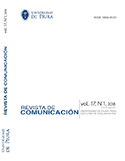
We present this new edition with the pleasant new that our journal has been accepted for inclusion in SCOPUS.
We observe that researchers feel some concern for the innovative elements in the world of communication, but also for the universal communication themes as it is seen at all times. Innovative trends, with technological roots, must be known, and adopted to the extent that they contribute to the improvement of all actors of communication and ultimately of the whole society. And in that digital environment, we notice the presence of universal issues. Transmedia storytelling of TV series and at the same time how power or cultural identities are reflected in them, brings our attention. Fashion films are explored, as new advertising formats, and the gender vision that is transmitted in the messages expresses great concern. The online world must coexist harmoniously with the off-line environment, because this is the real world that supports it. We refer to the humanization of communication in the digital environment. Let us see the ten themes that make up this edition.
Efforts to generate attractive advertising communication for the user are increasing in all sectors; specialized branded content is an example. Francisco Arbaiza and Shirley Huertas, from the Universidad de Piura, collect Quintiliano's rhetoric applied to commercial communication and analyze fashion films, as an advertising format that has broken into the fashion sector, and whose basis is to formulate content in which beauty and aesthetics predominate, but above all, it allows to communicate the brand's values and personality and thus connect with the consumer. In the same perspective of contents, Lila Farías and Varinia Cuello, from the Universidad de Viña del Mar, study the perception and self-perception of gender stereotypes in the advertising of university students in Valparaíso. The vision of young people, disagrees with that of commercial advertising, and even society. The university students have a more advanced concept of the genres integration; highlighting the importance of mutual respect.
Audiovisual narrative continues to transform influenced by a participatory culture of the prosumers. Peruvian researchers Tomás Atarama and Natalie Menacho propose a methodology for the analysis of a media ecosystem and from the comic Civil War produced by Marvel, describe the dynamics that occur in the transmedia world. Mayte Donstrup, from the Universidad de Sevilla, studies, from an anthropological point of view, the formation of identities in the Canadian series Vikings (2013-), created by Michael Hirst for The History Channel, around a main nucleus: power.
Sports, and essentially soccer, have their place in the world of communication. In a World Cup year, the journalist Alonso Pahuacho, from the Universidad Autonoma de Barcelona, has approached the studies on peruvian soccer and communication to ponder the role played by sports media in the construction of Peruvian social reality. And José Luis Rojas Torrijos, a spanish expert in sports journalism, studies the internationalization digital strategy of the Marca newspaper in Latin America, from the case of Marca Claro in Mexico. For the author, it is a key strategy to strengthen its economic viability in a complex time of change that affects the whole of the newspaper industry.
From traditional journalism, what concerns everyone are the environments which are not always favorable and rather dangerous, in which professional practices are performed in some countries of Latin America, and the policies of public television in Argentina. Professor María Teresa Nicolás Gavilán, from the Universidad Panamericana, analyzes the coverage of the murder of mexican journalist Javier Valdez according to the approach of peace journalism. The results point to a coverage with an opposite approach, called "war journalism". And Pablo Schleifer, from the University of Buenos Aires, focuses his research on government communication policies applied to the television channel of the province of Río Negro. He states that the meaning of that government intervention can be reconstructed from the constitution of the Board of the TV channel, the analysis of the programming and of the policies of impulse to diversity and plurality; and, from the forms of financing.
In the strictly digital environment, the interaction of users is important, but above all the level and quality of it. Mario Ure, a professor at the Universidad Catolica de Argentina, examines digital interaction and the search for engagement with users, and questions the conversationalist paradigm, which identifies online linguistic exchange as the maximum degree of evolution of a social communication that aspires to achieve understanding, closeness and collaboration. He refers that communication requires involvement "with" the other; a decentering of oneself that gives rise to the encounter, from which the community coexistence and collaboration derive.
Sustainability information has experienced an important development in recent years for Latin American companies. Julio Hernández, from the Universidad de Piura, analyzes the peruvian organizations that have also participated in information initiatives under the model of the Global Reporting Initiative (GRI).
We would like to invite you to enrich this academic forum with your scientific research.
The editor
